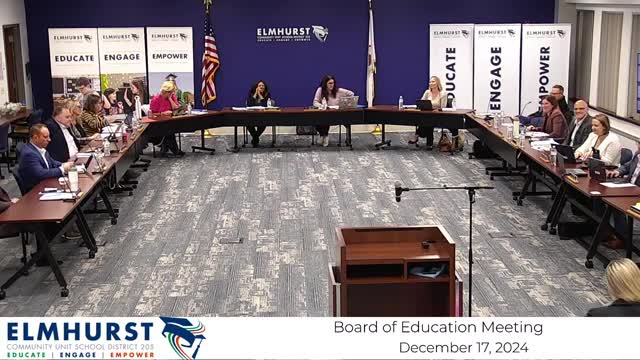Elmhurst District 205 board approves 2024 tax-levy resolution after public hearing
Get AI-powered insights, summaries, and transcripts
Subscribe
Summary
The Elmhurst Community Unit School District 205 Board of Education voted 7–0 on Dec. 17 to approve the district’s 2024 certificate of levy after a public hearing and a staff presentation explaining the levy components, the tax-cap (CPI 3.4%) and assumptions about new construction.
The Elmhurst Community Unit School District 205 Board of Education voted 7–0 on Dec. 17 to approve the district’s 2024 certificate of levy after a public hearing and a presentation by district staff.
District staff presented the levy components and the difference between a board’s levy request and the county extension that appears on property tax bills. “Tonight we are seeking board approval on the 02/24 tax levy,” said Chris, a district finance staff member, opening the overview. He told the board the statutory tax cap is the lesser of 5% and the consumer price index; CPI for the relevant year is 3.4%, which sets the operating cap at 3.4% for this levy.
The presentation explained that because new construction equalized assessed value (EAV) is unknown at levy time, districts commonly levy above the expected extension to capture possible new construction revenue. The district estimated new construction EAV at about $40,000,000 and described the 2024 levy request as roughly a 5.2% ask — the 3.4% capped operating portion plus an allowance for new-construction growth — while advising that the county will limit the actual extension to the tax-cap rules. The district also noted the operating portion represents about 89.8% of the levy and that on a $500,000 house with no new construction the district’s portion of the bill would increase by about $245.39 (the presentation’s estimate).
Board members asked clarifying questions about the levy calculation, the distinction between the levy and extension, and the district’s revenue outlook. The presenter described assumptions behind the projection — including prior-year CPI, expected state aid that is largely flat, reductions in federal ESSER funds, and pressure on operating expenditures such as staffing, benefits and transportation. The district identified insurance and other operating costs as drivers of budget pressure and said it is auditing departmental budgets and reviewing staffing ahead of the 2025–26 budget.
Public comment at the meeting included a speaker, Tom Chavez, who challenged aspects of district transparency and spending. “Transparency is the hallmark of good leadership,” Chavez said during public comment, adding that he had used FOIA to examine spending items and questioned the district’s promotional materials and purchases.
Board discussion before the vote emphasized balancing taxpayer impact with commitments to staffing, curriculum, facilities and safety investments. Multiple trustees highlighted the district’s strategic plan, investments in curriculum and technology, and the board’s past use of abatements to provide taxpayer relief. The board also noted the district’s lower tax rate compared with peer unit districts despite ongoing investments.
The board moved to approve the resolution. The motion to approve the 2024 certificate of levy was made and seconded; the motion passed on a voice vote recorded as 7 ayes, 0 nays.
Votes at a glance (formal actions recorded at the Dec. 17 meeting) - Motion to move into closed session at the start of the meeting — approved (recorded as passed; board moved to closed session before the open meeting). - Consent agenda (personnel report, financial report, FOIA requests, donations to York athletics, residency settlement) — approved (6 ayes, 0 nays, 1 absent). - Bid award: York vestibule (secure vestibule installation) — approved (7 ayes, 0 nays). The district explained the public bid process and reported three general-trade bidders and seven glass/glazing bidders; an independent construction-plan-room firm (ICI) reviewed bids and issued a recommendation to district staff. - Resolution: 2024 certificate of levy — approved (7 ayes, 0 nays). - PTA annual fundraising priorities — approved (7 ayes, 0 nays).
What the vote does and what remains the same The board’s resolution is the district’s formal request to the counties to levy property taxes for the district for calendar-year 2024 collections (budget year 2025–26). The county treasurers compute the final extensions that appear on tax bills and must apply the Property Tax Extension Limitation Act (the “tax cap”), which limits operating increases to the lesser of CPI or 5%. The district’s presentation reiterated that the levy request does not automatically become a larger tax bill beyond what state tax-cap rules permit; new construction EAV and the county’s computation determine the final rate and extension.
Key numbers and clarifications discussed at the meeting (as presented by district staff) - CPI used for the tax cap: 3.4% (calendar year 2023 CPI presented by the district). - New construction EAV estimate used for levy planning: approximately $40,000,000 (district estimate based on past years). - Operating portion of the levy: presented as roughly 89.8% of the total levy in the staff slides. - Estimated homeowner impact shown in the presentation: about $245.39 annual increase for the district portion on a $500,000 home with no new construction.
Next steps and related items After board approval the district will file the levy with the county offices by the statutory deadline (staff noted Dec. 20 in the presentation). The district also indicated it will revisit bond-and-interest abatement options in January; abatement decisions can reduce the bond-and-interest extension that otherwise appears on bills. The district’s budget process for fiscal 2025–26 will continue, with staff reviewing staffing and department budgets to reduce costs where feasible.
Reporting note: figures presented to the board include estimates and assumptions (for example, new-construction EAV and exact final extensions). Where the presentation did not provide a definitive final extension amount, the county’s extension process and the final EAV calculation (completed in March) determine the actual tax bills.
